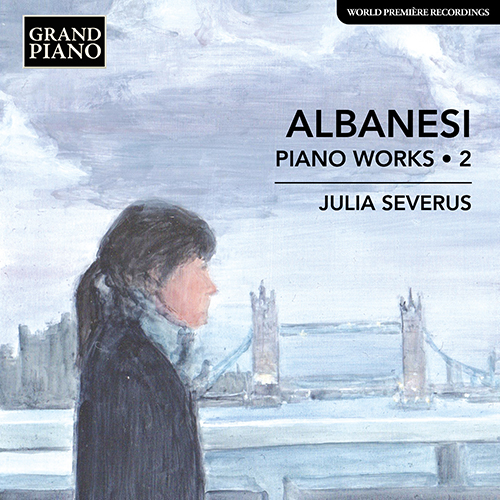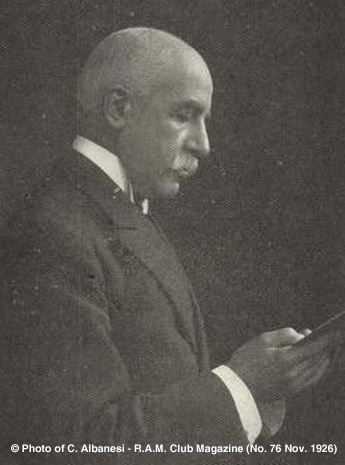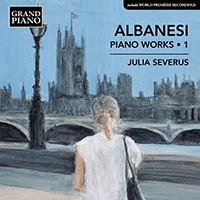
About this Release
ALBANESI, CARLO (1858–1926)
Piano Works • 2
- Julia Severus, piano
The Italian composer, Carlo Albanesi, moved to London in 1882 where he successfully balanced a career as a piano soloist with that of professor of piano at the Royal Academy of Music. The majority of Albanesi’s compositional output was for solo piano and his pedagogical publications are still in use by students today. His narrative and lyrical style is apparent in both the Six Romances without Words and the improvisatory Album Leaves, while the antique dances in the Piano Suite show the influence of Grieg. The sonatas are considered the quintessence of Albanesi’s oeuvre, and his last, the Sixth Sonata, contains an entire world of expressive nuance. Acclaimed pianist Julia Severus continues her survey of works by an unjustly forgotten composer pianist who was held in the highest esteem by colleagues, students and audiences alike.
Tracklist
|
6 Romanze senza parole (6 Romances without Words) () (00:18:00 )
|
|
1
No. 1. Con molto movimento (00:01:34)
|
|
2
No. 2. Andantino alla Barcarola (00:03:01)
|
|
3
No. 3. Piuttosto lento e soavemente (00:02:43)
|
|
4
No. 4. Molto agitato e presto (00:03:54)
|
|
5
No. 5. Allegro giusto (00:02:17)
|
|
6
No. 6. Lentamente a modo di Canzone (00:03:09)
|
|
Piano Sonata No. 6 in C Major () (00:25:00 )
|
|
7
I. Con movimento, ma quasi solenne (00:10:20)
|
|
8
II. Scherzo: Presto (00:04:09)
|
|
9
III. Andante quasi Romanza: Cantabile sostenuto (00:05:40)
|
|
10
IV. Finale: Allegro marciale (00:06:05)
|
|
Piano Suite, Op. 60, "Ritmi di danze antiche" () (00:15:00 )
|
|
11
I. Gavotta (00:01:13)
|
|
12
II. Sarabanda (00:02:18)
|
|
13
III. Pavana (00:02:51)
|
|
14
IV. Siciliana (00:02:15)
|
|
15
V. Rigodone (00:02:23)
|
|
6 Fogli d'Album (6 Album Leaves), Op. 13 (1876) (00:12:00 )
|
|
16
No. 1. Trattenimento (00:01:48)
|
|
17
No. 2. Ruscelletto (00:01:41)
|
|
18
No. 3. Romanza (00:02:13)
|
|
19
No. 4. Novelletta (00:02:15)
|
|
20
No. 5. Allegramente (00:01:55)
|
|
21
No. 6. Meditazione (00:03:26)
|
The Artist(s)
 Julia Severus began playing the piano at the age of four. She graduated from the Berlin University of Arts and from the Moscow Tchaikovsky Conservatory, where she studied piano with Mikhail Voskresensky and Lev Naumov. Wishing to explore piano ensemble repertoire, she founded the Aurora Duo and Quartet, performing numerous premieres and world premieres, among them Rodion Shchedrin’s Hommage à Chopin in the presence of the composer, followed by a recording for two pianos, eight hands, of Russian Romantic Piano Transcriptions (Naxos 8.557717). Her solo recordings, including Tchaikovsky’s opera and song transcriptions (GP795), have been highly praised. Julia Severus lives and works in Paris and Berlin.
Julia Severus began playing the piano at the age of four. She graduated from the Berlin University of Arts and from the Moscow Tchaikovsky Conservatory, where she studied piano with Mikhail Voskresensky and Lev Naumov. Wishing to explore piano ensemble repertoire, she founded the Aurora Duo and Quartet, performing numerous premieres and world premieres, among them Rodion Shchedrin’s Hommage à Chopin in the presence of the composer, followed by a recording for two pianos, eight hands, of Russian Romantic Piano Transcriptions (Naxos 8.557717). Her solo recordings, including Tchaikovsky’s opera and song transcriptions (GP795), have been highly praised. Julia Severus lives and works in Paris and Berlin. The Composer(s)
 Born in Naples, Carlo Albanesi settled in London in 1882 where he successfully balanced a career as a piano soloist with that of professor of piano at the Royal Academy of Music. His playing was distinguished by delicacy and this is a notable feature of his compositions, of which the sonatas are eloquent examples of his art, large in scale and Classical in form. The Sonata in D minor marries serenity with grandiosity, while the Sonata in B flat minor is wide-ranging and romantic. Renowned for her ‘beautiful tone and deep emotion’ (American Record Guide), acclaimed pianist Julia Severus performs works by an unjustly forgotten composer-pianist who was held in the highest esteem by colleagues, students and audiences alike.
Born in Naples, Carlo Albanesi settled in London in 1882 where he successfully balanced a career as a piano soloist with that of professor of piano at the Royal Academy of Music. His playing was distinguished by delicacy and this is a notable feature of his compositions, of which the sonatas are eloquent examples of his art, large in scale and Classical in form. The Sonata in D minor marries serenity with grandiosity, while the Sonata in B flat minor is wide-ranging and romantic. Renowned for her ‘beautiful tone and deep emotion’ (American Record Guide), acclaimed pianist Julia Severus performs works by an unjustly forgotten composer-pianist who was held in the highest esteem by colleagues, students and audiences alike. 

 Grand Piano has gained a reputation for producing high quality recordings of rare keyboard gems. Dedicated to the exploration of undiscovered piano repertoire, the label specialises in complete cycles of piano works by many lesser-known composers, whose output might otherwise have remained unknown and unrecorded.
Grand Piano has gained a reputation for producing high quality recordings of rare keyboard gems. Dedicated to the exploration of undiscovered piano repertoire, the label specialises in complete cycles of piano works by many lesser-known composers, whose output might otherwise have remained unknown and unrecorded.






